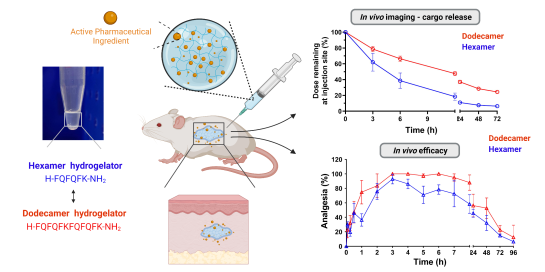
Peptide-based hydrogels represent promising systems for the sustained release of different types of drugs, ranging from small molecules to biologicals. Aiming at subcutaneous injection, which is a desirable parenteral administration route, especially for biologicals, we herein focus on physically crosslinked systems possessing thixotropic behaviour. The purpose of this study was to evaluate the in vitro and in vivo properties of hydrogels based on the amphipathic hexapeptide H-FQFQFK-NH2, which served as the lead sequence. Upon doubling the length of this peptide, the dodecapeptide H-FQFQFKFQFQFK-NH2 gave a significant improvement in terms of in vivo stability of the hydrogel post-injection, as monitored by nuclear SPECT/CT imaging. This increased hydrogel stability also led to a more prolonged in vivo release of encapsulated peptide cargoes. Even though no direct link with the mechanical properties of the hydrogels before injection could be made, an important effect of the subcutaneous medium was noticed on the rheological properties of the hydrogels in post in vivo injection measurements. The results were validated in vivo for a therapeutically relevant analgesic peptide using the hot-plate test as an acute pain model. It was confirmed that elongation of the hydrogelator sequence induced more extended antinociceptive effects. Altogether, this simple structural modification of the hydrogelating peptide could provide a basis for reaching longer durations of action upon use of these soft biomaterials.
The authors have paper dedicated this paper to the late Prof. Caroline Pauwels, Honorary Rector of the Vrije Universiteit Brussel.
